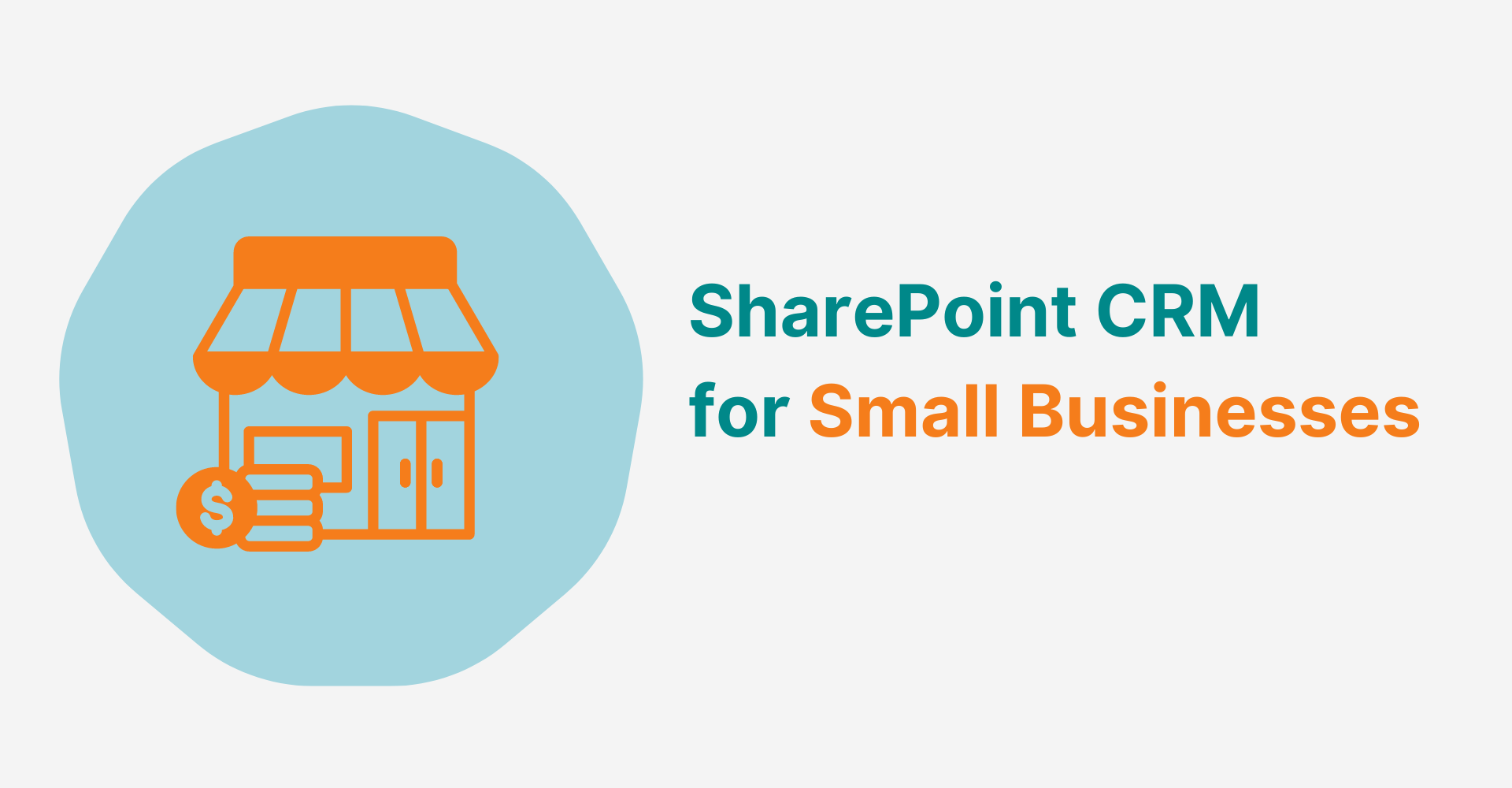Small businesses in today’s fast-paced market are always seeking for new ways to improve efficiency and gain a competitive advantage. SharePoint CRM stands out as a potential solution because to its extensive capabilities designed to simplify data management, improve collaboration, and allow scalability.
Is SharePoint CRM Scalable for Small Business Growth?
For a small business, the ability to scale operations efficiently is paramount. SharePoint CRM, known for its robust architecture, supports business growth seamlessly. It facilitates the management of increasing volumes of data and more complex operations without the need for frequent system upgrades or replacements. Integration with existing Microsoft products, which many small businesses already use, means SharePoint CRM can expand its capabilities as your business needs evolve, ensuring a smooth scaling process.
How Does SharePoint CRM Align with the Unique Needs of Small Enterprises?
SharePoint CRM is particularly well-suited to small enterprises due to its modular nature. It can serve varied functions across different departments—sales, customer service, or marketing—making it a versatile tool for small teams. Integration with Microsoft Teams and Office 365 can enhance productivity and ensure seamless communication, critical in a small business environment where flexibility and efficiency are key.
Tailored Solutions for Diverse Needs
One of the standout features of SharePoint CRM is its high degree of customizability. Small businesses often have unique workflows and processes that standard CRM solutions may not adequately address. SharePoint allows for extensive customization, enabling businesses to tailor the platform to specific requirements, such as custom fields, unique sales processes, or specialized reporting. This adaptability ensures that businesses can mould the CRM to fit their exact needs, enhancing functionality without requiring workarounds or compromises.
Enhanced Collaboration and Integration
SharePoint CRM excels in fostering collaboration among team members. It integrates well with Microsoft 365 (formerly Office 365), providing tools like Microsoft Teams, Outlook, and OneDrive within the same ecosystem. This integration supports real-time collaboration, document sharing, and communication, crucial for small teams where flexibility and rapid response times are essential. The ability to access CRM data through familiar interfaces reduces friction and encourages consistent use, which is vital for maintaining accurate data and deriving meaningful insights from it.
Scalability and Growth
For small businesses, growth is a significant goal, and SharePoint CRM supports this by being inherently scalable. As a business expands, its data handling and process management requirements will grow. SharePoint CRM can scale to accommodate increased demands without the need for significant additional investment in new software. This scalability ensures that small enterprises can continue to use the same system as they expand, avoiding the disruptions that come with transitioning to a new CRM system.
Cost-Effective Operation
Cost is always a consideration for small businesses. SharePoint CRM can be a cost-effective solution, particularly if a business is already using the Microsoft ecosystem. The integration reduces the need for multiple disparate systems, lowering overall IT costs. Furthermore, by consolidating various business functions into a single platform, SharePoint CRM can help reduce overheads associated with managing multiple systems and the training associated with each.
Ease of Integration and User Familiarity
A major advantage of SharePoint CRM is its integration with the Microsoft ecosystem, which many businesses already operate within. This integration facilitates a smooth transition and quick adoption, reducing the learning curve and associated training costs.
Customisability and Flexibility
SharePoint CRM stands out with its high level of customisability. It can be tailored to suit the unique processes of your business, from sales and customer service workflows to specific data reporting formats, making it a highly flexible tool that adapts to your business rather than the other way around.
Enhanced Collaboration
SharePoint CRM enhances teamwork by enabling better information sharing and project collaboration. Its features allow team members to access necessary information quickly and collaborate in real-time, improving overall productivity and helping to align efforts towards common business goals.
Are There Challenges in Implementing SharePoint CRM for Small Businesses?
Implementing SharePoint CRM is not without its challenges. Firstly, the complexity of setting up SharePoint CRM can be daunting. The system is powerful and versatile, but configuring it to align perfectly with a business’s specific processes requires technical expertise. This setup process involves detailed customization and integration with existing systems, which can be challenging without a dedicated IT team. The financial and time investments necessary for the initial setup, ongoing maintenance, and potential upgrades can strain limited resources typical of small enterprises.
Additionally, small businesses must consider the human aspect of implementing a new CRM system. Training staff to use SharePoint CRM effectively and diverting valuable resources from day-to-day operations are essentials.
What Factors Should Small Businesses Consider When Choosing a CRM Solution?
Choosing the right CRM solution is a critical decision for small businesses that can significantly affect their operational efficiency and customer relationships. Here are several key factors that small businesses should consider to ensure they select a CRM system that fits their specific needs and supports their growth objectives:
1. Cost Effectiveness
It’s essential to evaluate not just the initial cost of the CRM system but also the ongoing expenses such as subscriptions, updates, and additional features. Small businesses need to assess the total cost of ownership and determine if the CRM offers a favourable return on investment by enhancing customer engagement and streamlining operations.
2. Functional Fit
A CRM should match the specific needs of the business. This means it should comfortably handle the volume and type of customer data the business generates, integrate with existing sales and marketing processes, and support the customer service functions. Moreover, it should offer the flexibility to customise features to adapt as the business evolves and grows, ensuring the CRM can continue to meet changing requirements without costly replacements or extensive retraining.
3. User Experience
The CRM must be user-friendly to ensure that it is embraced by the staff. A system that is difficult to navigate or overly complex can lead to poor adoption, which undermines the value of the investment. The interface should be intuitive, training resources should be readily available, and the CRM should generally make the work of its users easier, not more complicated.
4. Integration Capabilities
For a CRM to truly be effective, it must seamlessly integrate with other tools that the business uses, such as email platforms, accounting software, and customer support systems. This integration helps to eliminate data silos, streamline workflows, and enhance data accuracy across the business. A CRM that integrates well with existing systems minimises the disruption during its implementation and maximises the overall efficiency.
5. Scalability
The chosen CRM system should be scalable to accommodate future business growth. This includes being able to handle an increasing number of customers, data, and potentially more complex business processes as the company grows. Scalability is crucial to avoid the need for frequent system changes, which can be costly and disruptive.
6. Vendor Support and Resources
The level of support provided by the CRM vendor is also a vital consideration. Good support can help a small business overcome initial teething problems and get the most out of their CRM investment. Availability of resources such as online tutorials, user forums, and responsive customer service are important for helping businesses effectively use the CRM.
Deciding on the right CRM solution, like SharePoint CRM, is critical for small businesses aiming to enhance efficiency and support growth. SharePoint offers a comprehensive, scalable solution that integrates well within the Microsoft ecosystem, offering significant advantages in terms of familiarity and ease of use. However, it’s important to balance these benefits with the potential challenges and ensure the solution fits the unique demands of your business.








